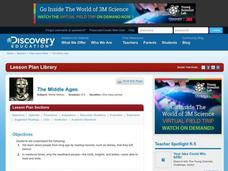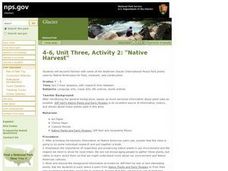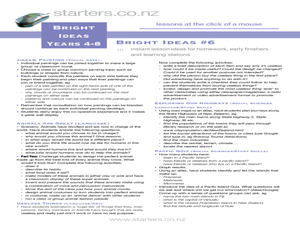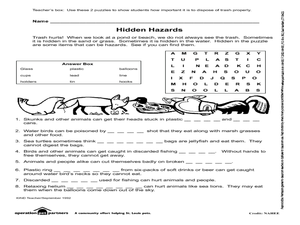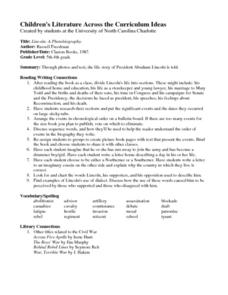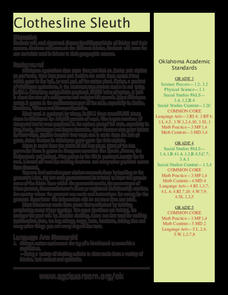Curated OER
Bible: Effects of Sin
Learners view the website known as http://www.kids4truth.com/eng_creation.htm and read the story of Creation. In this social science lesson, students discuss what the world looked like when it was perfect and then discuss the way looked...
Curated OER
The Middle Ages
Students discuss the Middle Ages. In this social science lesson, students role-play that they are medieval lords, knights, and ladies who keep diaries. Students write what they would have put in their diaries and decorate their diaries.
Curated OER
Native Harvest
Students read Native Plants and Early Peoples and explore the plants in Waterton-Glacier International Peace Park and find how the Native Americans used them. In this Native American plant and people instructional activity, students...
Curated OER
State Poster Fair: US Geography, Social Science, Art
Students research a US state, design and construct a state 'poster' to display important facts about that particular state. They present their work to the class.
Curated OER
Net Results
Students investigate through role play how decisions by watermen, recreational fisherpeople, and lawmakers influence and are influenced by economics and the abundance or scarcity of fish and shellfish stocks. They consider social,...
Curated OER
Salmon Scavenger Hunt
Students go on a salmon scavenger hunt to find out about threats to salmon populations. They gather information about some of the reasons wild salmon have gone from such incredible abundance to relative scarcity, and about some of the...
Curated OER
WHALES: GIANTS OF THE DEEP
Young scholars study humpback whale migrations, feeding, social organization, population, scientific investigations and compare humpback whales , research to explore a specific type of whale, and create their own replica of a whale.
Curated OER
Do As the Romans: Construct an Aqueduct!
Students explore how the Romans engineered and built aqueducts. They read a manual, explore the Construct a Roman Aqueduct online activity, and construct an aqueduct that will transport two liters of water across a short distance in the...
Curated OER
Eighteen Ways to Make a Baby
Students view a video clip about post-menopausal women having children. They identify the ethical, legal and social implications of this. They also read a case study.
Curated OER
Food Makes the World Go Round
Fifth graders investigate the origins of foods they eat while they consider social justice issues. In this food sources lesson, 5th graders play a game and then research food distribution, food security, and hunger in the world today....
Curated OER
Bright Ideas #6
Students complete activities as extra time, learning stations, or homework activities. In this extra time lesson, students may complete the activities for visual arts, language skills, and social sciences. Students participate in jigsaw...
Curated OER
Save the Earth: It's Everyone's Home!
Students complete activities to become more aware of environmental issues and the effect on plants and animals. In this environmental issues lesson, students use a globe to discuss issues with the environment. Students then take a trip...
Curated OER
Let's Clean Up Our Act and the Earth!
Students complete activities that help clean up the Earth and protect the environment. In this Earth protection lesson, students go outside and listen to the environment. Students discuss their observations and their role in protecting...
Curated OER
Social Class, Social Change, and Poverty
Students demonstrate how sociological research and literature can add to our understanding of poverty. They explore poverty and its implications on society and future organizations.
Curated OER
Children's Literature Across the Curriculum Ideas-Lincoln: A Photobiography
Students read Lincoln: A Photobiography by Russell Freedman. They complete a variety of cross-curricular activities surrounding the life of Abraham Lincoln, including, but not limited to, the Civil War. Included are reading, art, math,...
Curated OER
Clothesline Sleuth
What fabrics are our clothes made of? Where do those fabrics from? Lead your pupils to discover the answers to these questions and more. Class members have a chance to play with various fabrics, invesitgating the materials and labels...
Wild BC
Is Climate Change Good for Us?
Is it really that big of a deal if the global climate undergoes a little change? Young environmentalists consider this very question as they discuss in small groups the impact of different climate change scenarios on their lives, their...
PBS
Technology: Conveniences and Consequences
It's a delicate balance—using technology to improve our lives while still protecting the environment, and ourselves, from the hazards of technology use. Class members examine statistics about the increase in media use, complete a survey...
Curated OER
Human Cloning: Is it Biological Plagiarism?
Is cloning good or harmful? Help your class understand the risks and benefits as they read, research, and discuss human cloning. Individuals form teams, research information, and present to the class before concluding with an in-depth...
National Park Service
What Can We Do?
Motivate young conservationists to stand up and make a change. After learning about the efforts in Cascade Nation Park to reduce carbon emissions in order to preserve the wilderness, students work in groups creating action plans for...
Chicago Botanic Garden
Calculating Your Ecological Footprint
You can lower your ecological footprint by recycling! Lesson four in this series of five has individuals, through the use of a computer, calculate their ecological footprints. Through discussions and analysis they determine how many...
Safe Drinking Water Foundation
Making a Difference
After learning about the effects of water pollution, your class will discuss ways to make people in their community aware of the importance of water conservation. Then, your young environmentalists will write a letter to the local...
Chicago Botanic Garden
Introducing Ecosystem Services
Ecosystems provide many things humans not only use but also need in order to survive. The last lesson in the series of seven introduces scholars to the idea of ecosystem services, that ecosystems provide humans with many things we need....
Channel Islands Film
Lone Woman of San Nicolas Island: Lesson Plan 4
Imagine being stranded all alone on an island for 18 years. How would you survive? Class members are challenged to makes necessities out of natural materials that would likely be found on an island.



